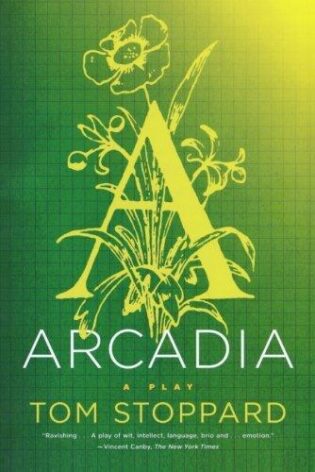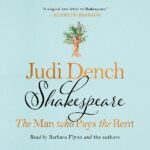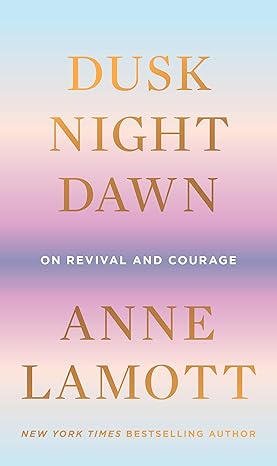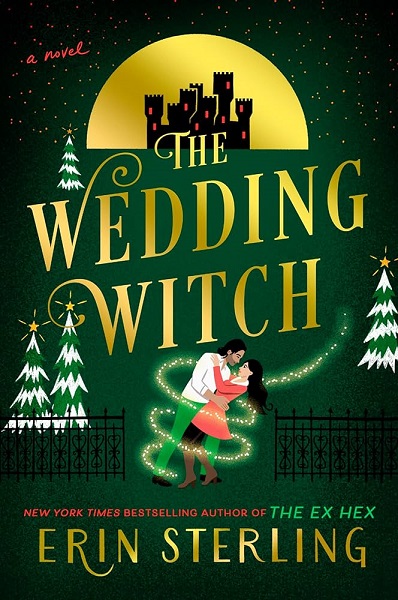 Arcadia by Tom Stoppard
Arcadia by Tom Stoppard Genres: Plays
Purchase: Amazon | Bookshop | Barnes & Noble
Add to Goodreads

In a large country house in Derbyshire in April 1809 sits Lady Thomasina Coverly, aged thirteen, and her tutor, Septimus Hodge. Through the window may be seen some of the “five hundred acres inclusive of lake” where Capability Brown’s idealized landscape is about to give way to the Gothic style: “everything but vampires,” as the garden historian Hannah Jarvis remarks to Bernard Nightingale when they stand in the same room 180 years later. Bernard has arrived to uncover the scandal which is said to have taken place when Lord Byron stayed at Sidley Park. Tom Stoppard’s masterful play takes us back and forth between the centuries and explores the nature of truth and time, the difference between the Classical and the Romantic temperament, and the disruptive influence of sex on our orbits in life―“the attraction,” as Hannah says, “which Newton left out.”
I recently read Arcadia with a play-reading group which meets over Zoom. It was my first encounter with the play, and I really enjoyed it. I’m having a hard time describing it, though, because Stoppard has crammed so much into it. The play explores a number of themes, among them the relationship of past and present, the Enlightenment vs. Romanticism, the challenges and pitfalls of historical research, and our tendency to believe what we want to be true instead of actual truth. Stoppard peoples the play with a number of interesting and in some cases eccentric characters, then weaves the themes together with mathematics and physics, landscape gardening, early 19th-century poets, a possible duel, and not a little off-stage sex. He tops off the entire intricate construction with with sparkling, witty, sometimes laugh-out-loud dialogue.
Arcadia is a play that probably should be seen rather than read. It’s harder when reading to fully appreciate the way in which its two time periods (the 1820s and the 2000s), initially separated into lengthy scenes but joined by a common setting and family, gradually draw closer as the scenes become shorter. Toward the end of the play, the timelines overlap altogether, with several of the main characters inhabiting the stage simultaneously whilst still distinctly within their own timelines. The parallels between some of the past and present characters and situations would be much more apparent if one could see them visually, particularly once the contemporary characters begin dressing up in pseudo-Regency attire for a costume party.
In the absence of a production to attend, however, I welcomed the opportunity to read it aloud with other theater-lovers. Arcadia was a delight, and a highlight of my reading month.
***
In case you’re wondering; I read Thomasina Coverly, the young mathematical genius in the early-19th-century timeline. When one of our group couldn’t return for the reading of Act 2, I took over the role of Chloe as well — like Thomasina, a daughter of the house, but in the modern timeline and somewhat different in personality. It was fun to switch between the two.
Reading this book contributed to these challenges:
- COYER Seasons 2022: Summer







































Jodie
A play reading group sounds amazing and would really give a fun perspective to this book. Thanks for sharing.
Wendy
Terrific review. I love the idea of a play reading group! It sounds like so much fun!
Wendy recently posted…Book Review: Lucy Checks In by Dee Ernst
Nicole @ BookWyrm Knits
This sounds so cool! I have been missing seeing live theatre the past couple of years (though I have started going back in small doses, and it’s wonderful).
Nicole @ BookWyrm Knits recently posted…Sunday Sundry ~ Six in Six for 2022
Katherine
A play reading group sounds like so much fun! It’s been years and years since I’ve done anything like that.
Lark_Bookwyrm
It has been so much fun! It began as an outlet when we were still all in lockdown, something that could mitigate our longing for theater and offer some of the camaraderie of working on a show. We’ve kept it up even as things have opened up, in part because some of us are still very cautious about crowds (so no movies or live theater), but mostly because we’re all enjoying it so much. I’m very grateful to the college friend who started the group and keeps us going.
Lory+@+Entering+the+Enchanted+Castle
I also enjoyed reading this and would love to see a production. A reading group would be better than nothing, but as you point out when a play’s meaning depends upon visual effects it’s hard to really get the full experience. Robertson Davies maintains that a play reader should be able to imagine the entire production but I am not up to that.
Lory+@+Entering+the+Enchanted+Castle recently posted…Postcards from Switzerland: Val Surses and Engadin
Lark_Bookwyrm
I tend to have a movie going in my head when I read, or at least a slide show, so if the stage directions are really good, I can visualize it. (And we do read any important bits of stage direction aloud.) I must admit that Noises Off, which depends very heavily on the physical actions of the actors, was a real challenge, as the stage directions are sometimes more extensive than the dialogue. We got through it, though, and we had a blast reading it.
It has been easier to picture what is going on with plays I have seen on stage before, of course. On the other hand, reading a play that is totally new to me means I come to it without any preconceptions, which makes it easier to adjust my performance to that of the other “actors.” Stoppard’s stage directions for Arcadia are particularly good, so I was able to visualize it fairly clearly once I had read through it a time or two (before our joint reading, I mean.)
verushka
A play reading group over Zoom is such a great idea to continue to enjoy the theatre in a way!
Lark_Bookwyrm
It has been so much fun. We started in late 2020 or early 2021, since all of us are theater-lovers who were stuck without theater due to the pandemic. We began with Shakespeare, because the plays were readily available online for free. We read mostly the comedies, plus The Tempest (which is not exactly a comedy but not sad or heavy, either.) We try to choose ensemble plays, and we’re avoiding anything depressing, since the whole idea is to have fun and distract ourselves from the state of the world. We still have some Shakespeare plays to go, but we have branched out into other playwrights, as you can see: Blithe Spirit, You Can’t Take it With You, Arsenic and Old Lace (I missed that one, alas). We meet five or six times a year, so far; it’s not always easy finding dates that work for enough people.